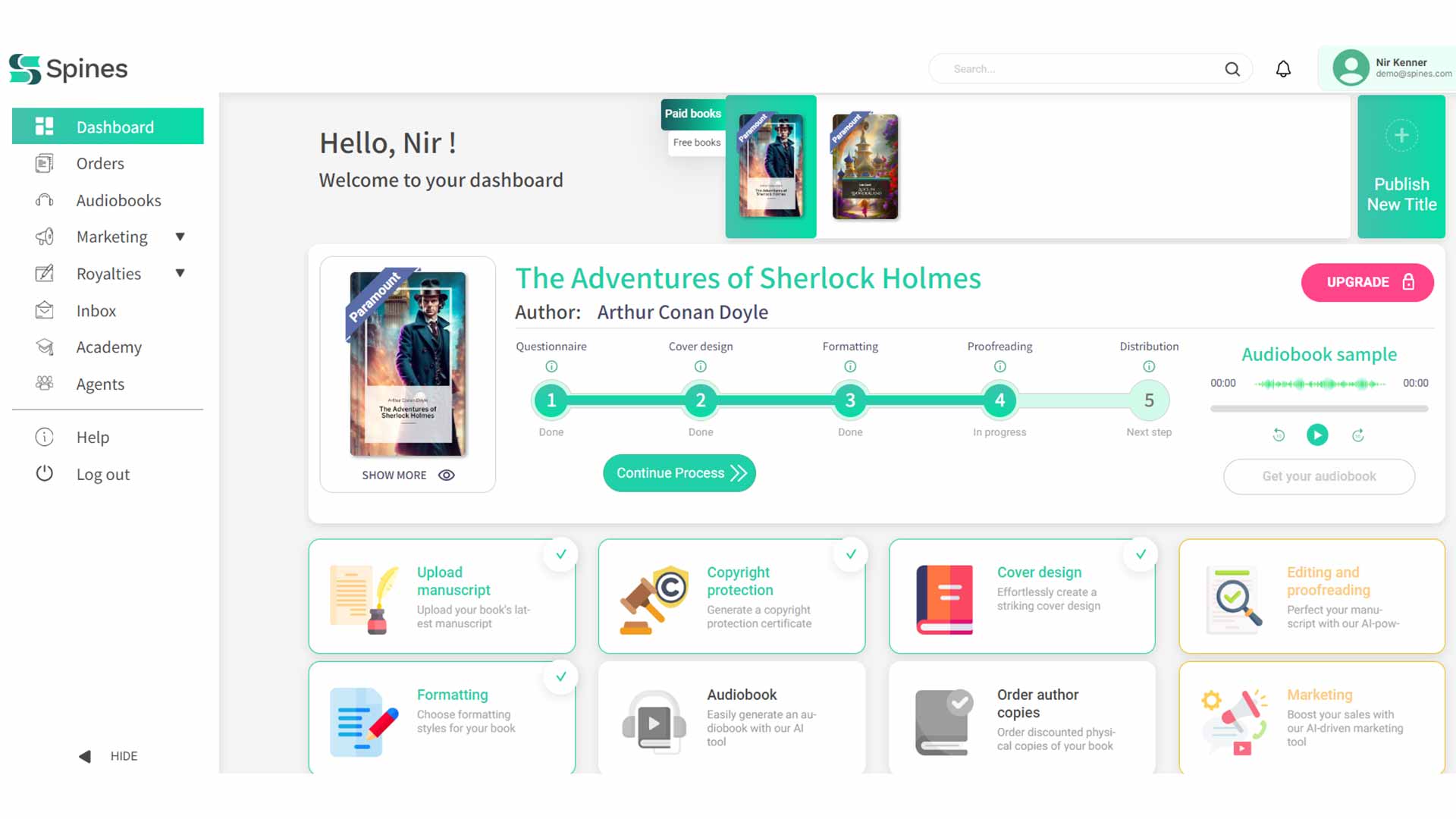You are viewing your 1 free article this month. Login to read more articles.
New publisher Spines aims to 'disrupt' industry by using AI to publish 8,000 books in 2025 alone


A new publisher has claimed it aims to “disrupt” the books industry by publishing 8,000 books in 2025 alone using artificial intelligence (AI). Spines, founded in 2021 but which published its first titles this year, is a startup technology business which—for a fee—is offering the use of AI to proofread, produce, publish and distribute books. The company charges up to $5,000 a book, but it can take just three weeks to go from a manuscript to a published title.
Spines isn’t the only tech firm trying to make its mark on publishing. Last week tech giant Microsoft launched its own imprint, 8080 Books, in order to accelerate it, telling the Guardian that “technology has quickened the pace of almost every industry except publishing". While ByteDance, the company behind the video-sharing platform TikTok, also announced that it will start selling print books in bookshops from early next year, published under its own imprint, 8th Note Press.
Spines recently secured $16m in series A funding and claims to have so far published 273 titles in September 2024, 33 of which were published on the same day. “We want to publish up to 8,000 books next year. The goal is to help a million authors publish their books,” Yehuda Niv, c.e.o and co-founder of Spines told The Bookseller.
Niv said he realised “three years ago that the publishing industry was about to be disrupted by this emerging technology named AI”. At the time, he ran a hybrid publisher and publishing services business in Israel called Niv Books. “I realised I had two options: either to be made irrelevant by AI, or to lead this opportunity in the world,” he said.
Of course, AI is already “disrupting” the publishing industry, with last week’s news that HarperCollins US is asking some of its non-fiction authors for permission to license their books to Microsoft to train its large language models (LLMs), following on from a slew of university presses, including Sage, Taylor & Francis and Wiley, who have already made deals offering tech firms their backlists to train chatbots and other AI tools. In early November, The Bookseller reported that Simon & Schuster-owned Dutch publisher Veen Bosch & Keuning (VBK) was “trialling” the use of AI to translate a limited number of its titles into English.
Like Microsoft’s 8080 Books, Spines has a focus on speed. Niv claimed the platform can reduce the time it takes to publish a book from six to 18 months, to two to three weeks. He claimed authors are willing to pay “tens of thousands” on publishing services for self-published books, but Spines costs $1,200 to $5,000 to automate proofreading, cover design, metadata optimisation and limited translation services, starting with Spanish.
Authors pay for the publishing services and retain 100% of their royalties as well as rights to their words once their books are in the world, which looks like self-publishing. Niv, however, claims Spines “isn’t self-publishing, is not a traditional publisher and is not a vanity publisher”. He added: “We are a publishing platform. That’s a new concept.”
Continued…
When challenged over the potential negative impact automated AI processes might have on the livelihoods of proofreaders, book designers, translators, editors and other professionals in the book trade, he said: “We are not here to replace human creativity. We focus on books that are written by humans who are looking for the most efficient and up-to-date way to get their manuscript published and distributed worldwide.”
Given that Authors’ Licensing and Collecting Society research shows that in 2006, average author earnings were £12,330, dropping to £7,000 in 2022, the value of forking out up to $5,000 to have a book published in three weeks might be questionable. But Niv claims that for most authors it isn’t about profit: “It’s a self-branding process. Let’s say you want to leave a mark, or a legacy… most people publish a book, not because they want to make a living from that. It’s their hobby. Either they must become very, very famous to [get a traditional publishing deal] or they will have to invest tens of thousands of dollars… I want to help bring books to the masses.”
The Bookseller asked if any of the titles published by Spines have gone on to be bestsellers. Niv said: “Yes, we’ve had several successes.” A follow up e-mail supplied the names of seven titles published this year that Spines claim are bestsellers. When asked for sales volume information they said “that data is private and belongs to the author”. Of the six titles The Bookseller could find for sale on Amazon, one had more than 70 reader ratings, with the others ranging from seven to 22 ratings.
Next on Spines’ disruption hitlist is audio that can clone the voices of authors, as Niv explained: “Our platform can also create an audiobook version using synthetic voice. Soon, we will add a feature that clones the author’s own voice. That’s not released yet. We are still working on it.”
The question is whether the Spines-style approach will have a knock-on effect in traditional publishing. Editorial consultant Anne Hervé told The Bookseller: "AI is a total hot-button topic. Everything is being related back to it right now. At most of the big publishers, over, say, the last 20 or so years, all the various internal roles and responsibilities within the different departments have expanded hugely, and so our workloads have hugely expanded too. I think, for most of us, we are looking to see how we can take some of that pressure off and offload some of the less skilled work, as it were, onto AI. Populating metadata, for example, which is vital but time consuming, could potentially be streamlined, freeing us up for more creative work.
"We want AI to do the washing up for us, not to paint the Sistine Chapel. We need humans and human skills for nuance, and there’s a huge amount that goes into the developmental editing process that simply can’t be replicated with AI. And I don’t think you’d want to anyway, as you risk losing some of the magic."
















